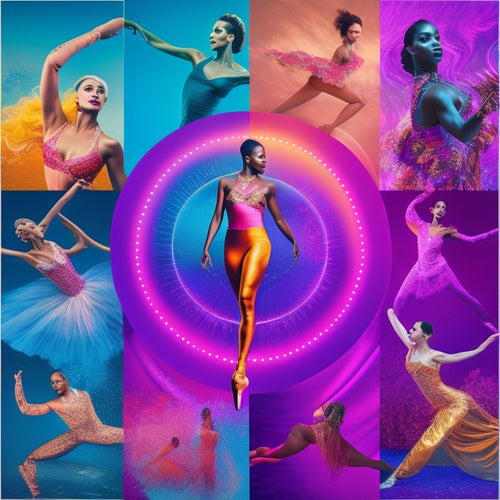
Tax Break Secrets for Performance Artists Unveiled
Share
Performance artists can discover significant tax savings by understanding the deductible expenses available to them. Travel allowances, work-related car expenses, and costume deductions are just a few examples of legitimate claims. However, it's equally important to be aware of non-deductible expenses, such as personal attire and entertainment costs, to avoid costly mistakes. By collaborating with a professional tax agent who specializes in the entertainment industry, artists can optimize their returns and achieve greater financial stability. By grasping the intricacies of tax laws and regulations, artists can take control of their financial futures and reveal the secrets to minimizing their tax liability.
Key Takeaways
• Performance artists can deduct travel allowances, work-related car expenses, and accommodation and meals for work-related travel.
• Costume deductions can be claimed for protective clothing required for work, and specialized items like makeup remover can be deducted.
• Professional tax agents can navigate the complex tax landscape, optimize returns, and provide expert tax planning and financial advice.
• Artists must stay informed of current laws and regulations, understanding taxation loopholes for work-related expenses to minimize tax liability.
• Expert tax accountants provide tailored tax planning and financial advice, identifying potential savings and developing a thorough tax strategy.
Deductible Expenses for Artists
Frequently, performance artists overlook a multitude of deductible expenses that can greatly impact their tax returns, making it essential to familiarize themselves with the various claimable costs associated with their profession.
Travel allowances, for instance, can be deducted for trips between different jobs on the same day, work-related car expenses, and accommodation and meals for work-related travel.
Additionally, costume deductions can be claimed for protective clothing required for work, costumes and dance shoes for specific roles, and specialized items like makeup remover.
Non-Deductible Expenses to Avoid
Performance artists must be mindful of non-deductible expenses that can mistakenly be claimed, in order to avoid audits and guarantee precise tax returns. Personal expenses, such as regular attire and standard meals, are not eligible for deductions.
Additionally, entertainment costs, including expenses for non-work gatherings, are also not deductible. It is vital to distinguish between personal and business-related expenses to avoid misclaiming deductions.
Upfront agency fees, audition costs, and childcare expenses during work hours are also non-deductible. By being aware of these non-deductible expenses, performance artists can ensure precise tax returns and avoid potential audits.
Proper record-keeping and differentiation between personal and business expenses are important in maintaining compliance with tax regulations.
Benefits of Professional Tax Agents
Engaging a professional tax agent can be a valuable investment for performance artists. These experts can navigate the complex tax landscape and optimize returns, allowing artists to focus on their craft.
By entrusting a tax agent with their financial affairs, artists can benefit from expert tax planning and financial advice tailored to their unique needs. This enables them to make informed decisions about their financial situation, ensuring they take advantage of available deductions and minimize their tax liability.
With a professional tax agent handling their tax obligations, artists can redirect their energy towards perfecting their performance, confident that their financial affairs are in capable hands. This partnership can lead to increased financial stability, allowing artists to pursue their creative passions with greater freedom and security.
Taxation Information and Tips
In the world of taxation, performance artists must remain vigilant about staying informed of current laws and regulations to maximize their deductions and minimize their tax liability.
Staying up-to-date on taxation FAQs and regulations is critical to avoid costly mistakes. Understanding taxation loopholes that can benefit performance artists, such as claiming deductions for work-related expenses, is vital.
However, being aware of the risks of taxation audits, which can result in penalties and fines, is equally important. By staying informed and seeking expert advice, performance artists can navigate the complex world of taxation with confidence, ensuring they take advantage of every available tax break and minimize their tax liability.
Expert Taxation Services for Artists
Optimizing tax returns demands specialized knowledge, which is why performance artists often benefit from partnering with expert tax accountants who understand the unique challenges and opportunities inherent in the entertainment industry. These professionals provide tailored tax planning and financial advice, ensuring artists capitalize on deductions and credits specific to their profession.
By leveraging their expertise, artists can focus on their craft while minimizing their tax liability and maximizing their financial returns. A seasoned tax accountant can help navigate complex tax laws, identify areas of potential savings, and develop a thorough tax strategy that aligns with the artist's financial goals.
Claiming Deductions Like a Pro
When it comes to maneuvering the complex terrain of tax deductions, performance artists must be meticulous in tracking and claiming eligible expenses to maximize their financial returns. Effective tax planning and savings strategies are essential to optimize deductions and minimize taxable income.
| Expense Category | Eligible Expenses | Ineligible Expenses |
|---|---|---|
| Travel | Work-related travel, accommodation, and meals | Personal travel expenses |
| Work Clothing | Costumes, dance shoes, and protective gear | Regular clothing |
| Multimedia | Music files, software, and equipment | Personal entertainment expenses |
| Self-Education | Courses, training, and publications related to performing arts | Unrelated courses or hobbies |
Get Expert Tax Help Today
Your performance career demands precise financial management, and partnering with a seasoned tax professional can greatly enhance your bottom line.
By leveraging their expertise, you can maximize your deductions and minimize your tax liability.
For instance, a tax expert can help you navigate complex travel deductions, ensuring you claim every eligible expense, from fuel and tolls to accommodation and meals.
They can also guide you on work clothing expenses, such as protective gear, costumes, and specialized items like makeup remover.
With their guidance, you can focus on perfecting your craft while they handle the financial intricacies.
Don't leave money on the table – get expert tax help today and optimize your financial performance.
Frequently Asked Questions
Can I Claim Expenses for My Home Office or Studio Space?
When claiming home office or studio space expenses, consider rent deduction, studio organization, and creative supplies. Additionally, factor in equipment maintenance costs to guarantee accurate tax deductions for your performance art business.
How Do I Separate Personal and Work-Related Phone Usage?
To separate personal and work-related phone usage, maintain a detailed log of work calls and data usage, ensuring data privacy, and employ effective time management strategies to accurately track and claim work-related expenses.
Are Business Gifts to Clients or Collaborators Tax Deductible?
Business gifts to clients or collaborators are not typically tax deductible as a business expense, unless they are directly related to a specific business transaction or fall under the category of deductible entertainment expenses.
Can I Claim Travel Expenses for Attending Industry Conferences?
When attending industry conferences, performance artists can claim travel expenses as deductions, including transportation, accommodation, and meal expenses, but must make sure these costs are directly related to their profession and not classified as entertainment deductions.
Is It Necessary to Keep Receipts for All Business-Related Expenses?
As a master artist weaves a tapestry of creativity, so too must they meticulously weave a trail of receipts, records, and logs to substantiate business expenses, ensuring a harmonious symphony of record keeping and tax compliance.
Related Posts
-

3 Essential Tips for Dance Makeup Online Visibility
You need a strong online presence to stand out in the competitive dance makeup industry. To boost your online visibil...
-

Hip Hop Dance Studies: A Comprehensive Guide
Hip hop dance, born from the intersection of music, culture, and movement, has evolved into a global phenomenon, inco...
-

Dance Poster Showcases Array of Dance Styles
In addition to showcasing a diverse array of dance styles, dance posters provide a visually engaging tool for cultura...


